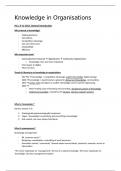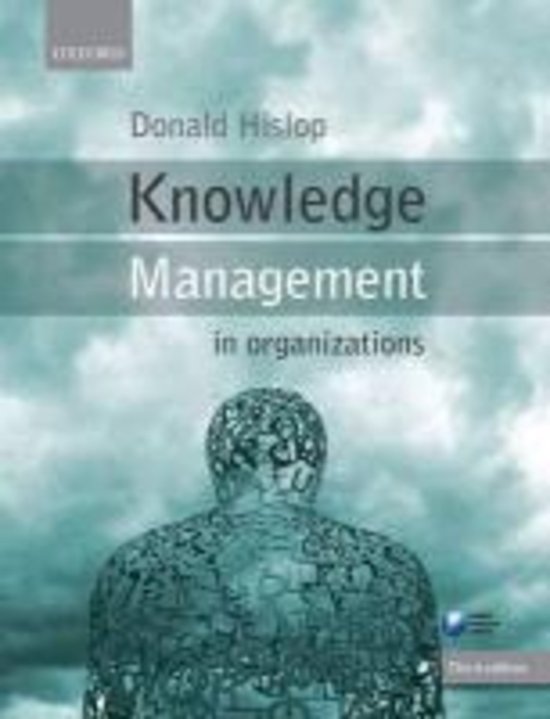Knowledge in Organisations
HC1, 8-11-2023, General introduction
Why interest in knowledge?
- Making decisions
- Innovations
- Competitive advantage
- Can save time/costs
- Avoid pitfalls
- Efficiency
Why important now?
- Automatization/industrial digitalization datafication/digitalization
o Knowledge more and more important
- From paper to digital.
- More services
Trends in literature on knowledge in organizations
- ‘80/’90s knowledge = competitive advantage, explicit knowledge, digital storage
- 2000 knowledge = experimental, captured in doing, tacit knowledge, communities.
- 2010 power, tool and object in conflict. Knowledge can be used for oppressing.
- 2020
o Never-ending cycle of knowing and correcting, disciplinary power of knowledge
o Collective knowledge, created by ICT big data, decision support systems
What is ‘knowledge’?
Hard to answer, it is:
1. Ontologically/epistemologically incoherent
2. Vague: ‘knowledge is everything and everything is knowledge’
3. Not neutral, not even always functional.
What is management?
Knowledge management
- Bit ‘common sense’?
- Designing, coordination, controlling of work processes
- Normative control, ‘community’ (shared values/norms/ideas), protocols, manuals; access to
information
“The more emphasize on ‘management’, the less it is about knowledge. The more emphasize on
‘knowledge’, the less management matters”
,Epistemologies of ‘Knowledge in organizations’
Epistemology dimension
- How knowledge is defined is a matter of epistemology
o Epistemology = philosophy addressing the nature of knowledge. ‘Knowledge about
knowledge’. How do we define what is true? What is regarded as alid knowledge and
why?
- Dualism – what is knowledge?
Objective, frozen-in-time, either/or; subjective/objective; self/other; macro/micro; binaries;
mutually exclusive opposites, uni-directional, every object has a separate identity
- Duality – when is knowledge?
Both/and/as well as, no clear out distinction, one does not exist without the other,
pragmatism, theories of practice knowledge is in the doing, associated with emergence,
cyclical causality, object is continuously shaped by context/situated practice.
o Knowledge of now, can be different 2 hours from now in a different setting
Social order dimension
Social order = continuum bounded by:
- Sociology of regulation – society tends towards ideal state of integration, equilibrium and
order CONSENSUS
Trust – common interest – science/knowledge is neutral
o Glass is half full
- Sociology of radical change – forces of coercion, conflict and change are continuously
challenging the established social order (‘truce’ is only temporary) DISSENSUS
Suspicion – conflict of interest – science/knowledge is political
o Glass is half empty
Four discourses on Knowledge Management – Schultze & Stabell, 2004
, - Neo-functionalist discourse
o Knowledge = asset
o Objective, measurable, it can be acquired. Progressive enlightenment (it takes
knowledge to solve issues society), reduction
- Constructivist discourse
o Knowledge = mind collective mind created while interacting
o Management facilitates to work together and create tacit knowledge/shared mind.
- Critical discourse
o Knowledge = power
o Those who have knowledge have power over those who don’t.
o If you have it you make sure you make the best benefit of it.
- Dialogical discourse
o Knowledge = discipline
Objectivists perspective: typologies of knowledge
Tacit knowledge
- Inexpressible in a codifiable form
- Subjective
- Personal
- Context-specific
- Difficult to share. Only to do with working together and interacting a lot.
- Tacit knowledge is ‘knowledge that is nonverbalized, or even nonverbalizable, intuitive,
unarticulated’ (Hedlund, 1994, p.75)
Example: How you can use experience of your work during the study
Explicit knowledge
- Codifiable
- Objective
- Impersonal
- Context independent
- Easy to share
- Explicit knowledge is easy to replicate and transfer (Grant, 1996)
Example: course description on Brightspace.
Constructivist (practice-based) perspective
Practice refers to purposeful human activity. It assumes that activity includes both physical and
cognitive elements, and that these elements are inseparable. Knowledge use and development is
therefore regarded as a fundamental aspect of activity.
Bijvoorbeeld voetbal. Alleen tegen een bal aan schoppen is geen voetbal. Het draait ook om
de regels etc.
, Critical discourse on Knowledge in Organizations
- Dualism: there is a ‘good’ and ‘bad’, the ‘powerful group that is evil’ vs. the ‘powerless groups
that are pure, innocent and helpless’;
- Knowledge is an object to be owned, bought, sold
- Connects political issue (labour processes)
- Role of knowledge is to raise awareness of the prevailing social injustices;
- Management of (tacit) knowledge is exploitation of managers (those owning capital) to own
all knowledge relevant to obtain more power and resources (e.g., money);
- Critical discourse is ‘anti-management’ and aligns itself with interests of workers
Dialogical discourse on Knowledge in Organizations
- Interested in the role of knowledge in the exercise of power and control, yet lacks the
political agenda and moral stance (does not pick sides, hence ‘duality’)
- Ongoing struggle, dynamically shifting positions (no right or wrong)
- Knowledge is discipline – the disciplinary practices that shape and are shaped by knowledge
- Power/knowledge: before something can be controled/managed, it must first be known
- Focus on practices such as performance appraisals, mentoring and practices of the self, with
emphasis on the normalizing thought and actions
- Aim of this discourse is to deconstruct self-evident concepts and power relations; prevention
of normalization and totalization (enough room for the marginalized)
HC2, 10-11-2023, The neo-functionalist discourse
What is knowledge (management) from a neo-functionalist perspective
Focal point: the neo-functionalist discourse
On exam, when there is asked for the
definition of a discourse, this should be
based on the dimensions






